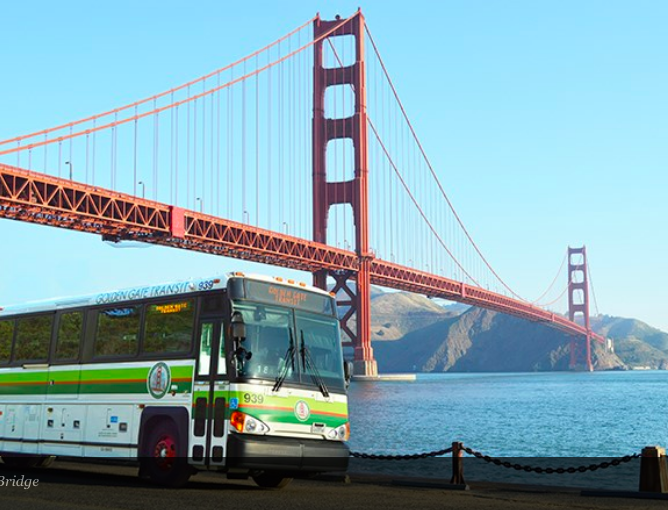Note: GJEL Accident Attorneys regularly sponsors coverage on Streetsblog San Francisco and Streetsblog California. Unless noted in the story, GJEL Accident Attorneys is not consulted for the content or editorial direction of the sponsored content.
Transit agencies in the San Francisco Bay Area rely more heavily on farebox revenue than most agencies throughout the rest of the country. In the past, that has been a source of pride, but in the face of steep ridership drops during the pandemic, it has transformed into a kind of Achilles' heel.
Federal aid helped the agencies continue to provide service to the workers who relied on it during pandemic shutdowns, but that emergency help is coming to an end. Meanwhile a host of factors have kept ridership levels from returning to prepandemic levels, and those large transit agencies that had relied heavily on fare-paying riders are being faced with an existential crisis.
Representatives from several of the agencies and the Metropolitan Transportation Commission laid out the issues to the Senate Select Committee on Bay Area Public Transit, which met for the first time this week. There were no decisions being made, no legislation to discuss at the hearing. But there is pressure to take action, especially after Governor Newsom's May budget revision continued to ignore transit.
California has never taken a huge role in funding transit - SPUR's Laura Tolkoff said the majority of transit operations funding in California comes through fares and taxes, with the state providing only a small portion of it. That is is why many of its agencies rely so heavily on farebox revenue, supplemented by local and regional tax measures. This is low compared to other states, she said, citing New York (where the state provides thirty percent of operations funding) and Pennsylvania (fifty percent) as examples.
"California's policy goals are ambitious," she said, "and funding levels have not caught up with its mobility, climate, equity, and housing goals."
Several speakers were asking the state for one-time emergency funding to give agencies time to come up with other sources of funding, which can take a while. The MTC is planning to put together a regional tax measure, for example, but that needs to be approved by the Legislature and then passed by voters, which would take a minimum of several years.
"The only way to stop a death spiral is to backstop with emergency funding for the near-term to avoid major service cuts," said Tolkoff. "If you want transit fifty years from now, you can't let it collapse in the next five."
Meanwhile, some of the larger agencies would hit the end of their funding, and would be forced to cut services so drastically that they may never be able to recover. SF Muni, for example, estimates that it would have to eliminate about twenty bus lines, and BART would be forced to cut all weekend service entirely and curtail weekday service as well.
"This is not a crisis driven by financial mismanagement," said Committee Chair Scott Wiener. "No amount of belt tightening or fare increases or service cuts would have kept this from happening."
"We must work to identify long-term funding sources, and we need short-term aid, while also implementing service changes and other reforms to help regrow ridership."
Over the last few years, the pandemic resulted in huge shifts in transit use . "There have been massive increases in remote work, especially in the Bay Area," said Rebecca Long of the MTC. This has forced agencies to rethink their purpose, and find ways to efficiently accommodate riders outside of the usual commute hours. For example, the Golden Gate Bridge Highway and Transportation District - which manages every way across the Golden Gate Bridge including the bridge itself, buses, and ferries - says that while commuters are staying home, recreational and tourist travel have mostly returned. Their efforts to be efficient include "right sizing" staff - they employ 100 fewer bus operators than before the pandemic. Also, "we will not run empty buses," said Denis Mulligan, the District's General Manager. "If we did, we would have run out of federal aid funding already."
The District saw dramatic cuts to its revenue over the past few years. Before the pandemic, Golden Gate Bridge tolls were their top source of funding, and transit fares the second, above all other sources. Now, fewer people commute on the bridge, and only seventeen percent of the riders have returned to their express buses, which delivered riders to Santa Rosa and across the Richmond San Rafael Bridge.
BART recently conducted a major survey to find out what it would take for its former commute riders to return, and safety and cleanliness were at the top of almost everyone's list. So they increased the presence of BART officers on the trains - they were extremely rare sightings prepandemic, but common to see riding and chatting with people onboard now - as well as unarmed ambassadors. They have increased their cleaning regimen, sweeping every car at each end of its run and doing more "deep cleaning" at night.
Those former riders, some of whom have switched to cars, won't know about those changes unless they ride the system, though, and safe and clean gets a lot less attention than dirty and mean.






